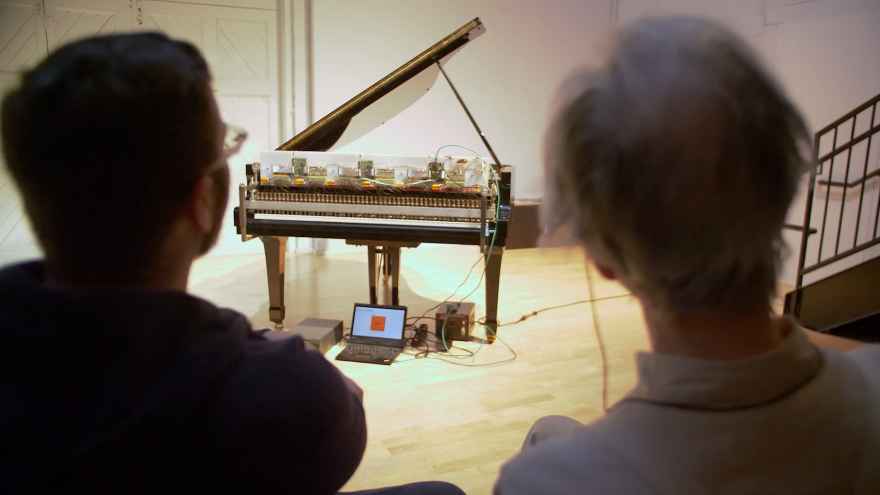Experimental Composer Channels The Doors During UChicago Residency

The following was published in UChicago News on February 5, 2020.
The piano keys hammer with life, reproducing a decades-old rock concert. No one sits at the controls, but the source is in full view: Magnets and circuit boards line the instrument, and wires flow toward a computer on the floor.
Music’s Over is the latest project from Austrian composer Peter Ablinger, who debuted the innovative installation in January at the University of Chicago. The composition marked the latest realization of Ablinger’s work with piano automatons—computer-controlled instruments he uses to explore “phonorealism,” a term he coined for the replication of recorded sounds.
In this instance, the source material was The Doors’ 1970 performance of “When the Music’s Over”—one of the iconic band’s final live appearances.
Ablinger wanted Music’s Over, operated by the push of a button, to trigger different receptions for every viewer and listener, even those sitting side by side.
“When I make music, it’s never just music,” he said. “It’s always also about music—like a view from outside of it. And the idea of Music’s Over gives me such a view: A utopian possibility that music is gone.
“We don’t have music anymore. But we still maybe have a historic look on it, or we have a desire on something that we have lost.”
Constructed by longtime collaborator Winfried Ritsch, Music’s Over was the centerpiece of Ablinger’s nine-day residency at UChicago’s Richard and Mary L. Gray Center for Arts and Inquiry. The residency featured a range of talks, discussions, composition seminars and performances—reflecting the Gray Center’s mission as a forum for experimental collaboration between artists and scholars.
The residency inaugurated Gray Sound, a new program conceived by Gray Center director Seth Brodsky, a leading scholar of 20th- and 21st-century musical modernism. Envisioned as a regular performance and discussion series, Gray Sound represents a chance for prominent artists and the UChicago community to tease the boundaries of sound—when it moves from voice to music, from a recognizable tune to noise.
“Music has always been one way we describe sounds that speak to us,” said Brodsky, an associate professor in the Department of Music and in the Division of the Humanities. “Here, you get a kind of radical reimagination of that from a machine and a source that you know very well is not talking, not speaking—and nonetheless, is.”
By hosting Ablinger in partnership with Goethe-Institut Chicago, Brodsky sought to establish the Gray Sound series as a space for aural exploration. In addition to talks and performances, Ablinger’s residency featured a concert with the Wet Ink Ensemble, a group which includes experimental musician Sam Pluta, an assistant professor in the Department of Music.
Zachary Cahill called Ablinger “a genre unto himself,” straddling the worlds of music and sound art. The Gray Center’s director of programs and fellowships, Cahill was particularly struck by the final concert of the residency—a night which saw Ablinger debut 3 Places Chicago, a site-specific work tuned acoustically to different spaces at the Gray Center Lab and the Logan Center for the Arts.
Played by Chicago-based ensemble a•pe•ri•od•ic and co-organized with their director Nomi Epstein, the performance was “utterly sublime and transportive.”
“It was a work at once exquisitely sutured to the spaces on campus and blissfully fugitive in its temporality,” Cahill said. “In a word, it was singular. This is what we aspire to in our own work at the Gray Center.”
—To learn more about Music’s Over, read a Q&A with artist and engineer Winfried Ritsch at the UChicago Arts blog.